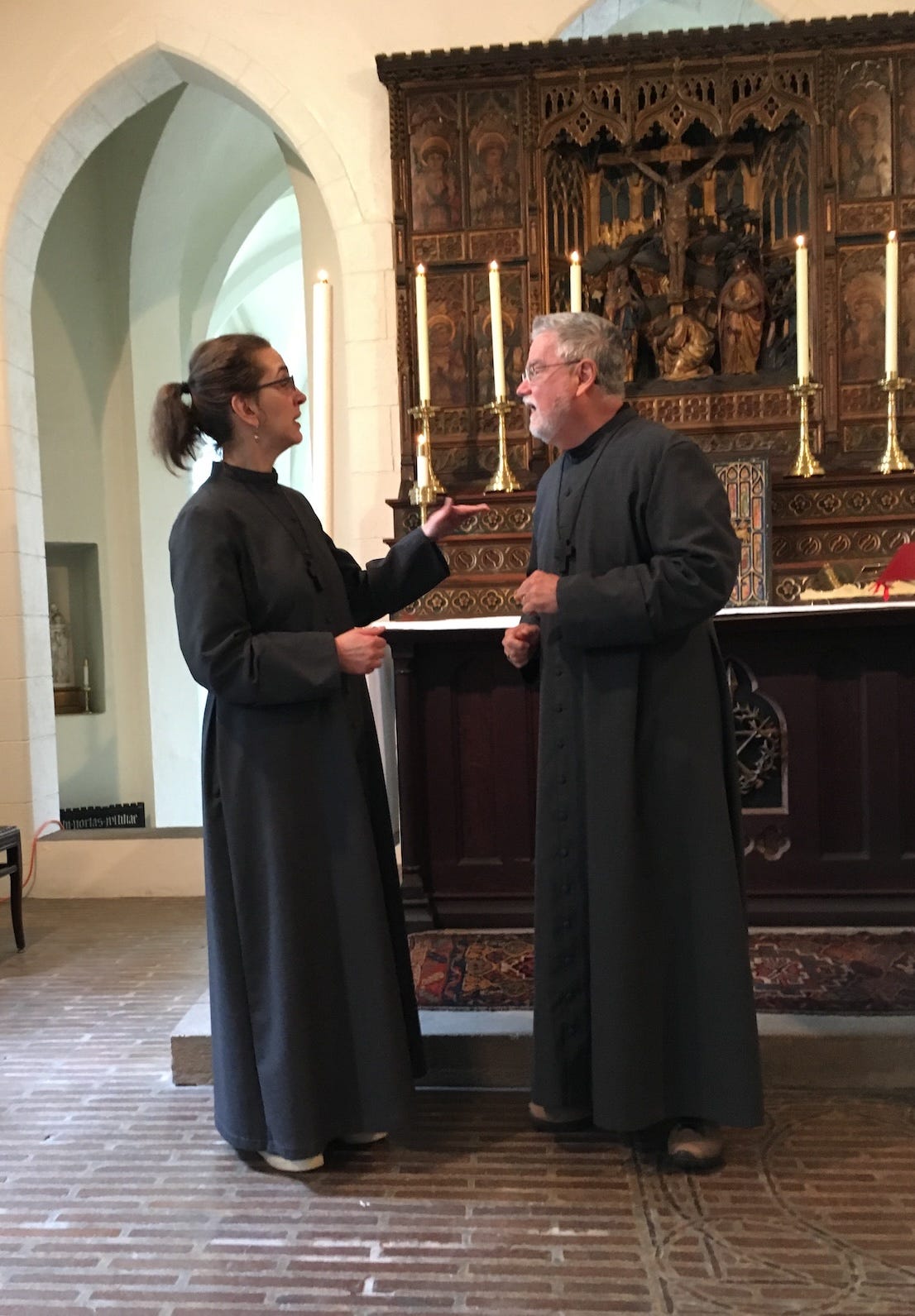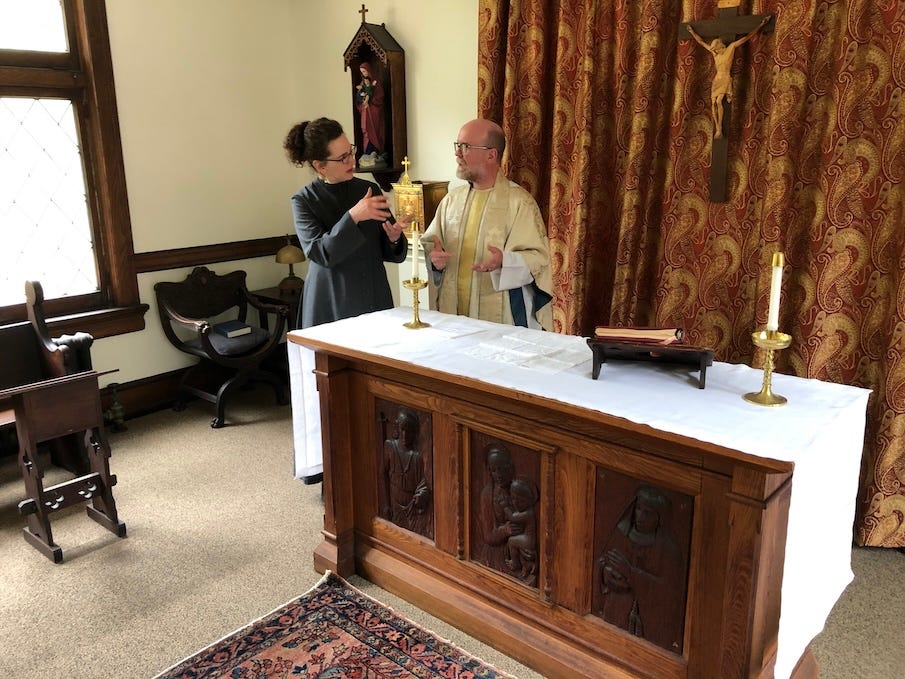“It’s Stage IV”
Awful words. A dear friend heard them recently in regard to his wife. They’ve been in my prayers daily.
But human being that I am, with all the usual limitations and narcissism, my mind keeps returning to when I heard those awful words. It came in two stages. First, it was 2009. The night before I had preached at Trinity, Seattle, returned home, and fainted. So, there I was on Thanksgiving in the hospital, a young doctor standing by my bed, tears in his eyes (was I the first one he ever had to say this to?), “you have esophageal cancer.” The second stage was a few weeks later with my oncologist. He’s the one who said, “It’s Stage IV.” Then I asked about hospice care.
In the 70s and 80s and again in the early part of this century, I spent a good bit of time on the training staff of workshops in human relations and group development. We were helping participants see and attend to the process they were engaged in. Both what was going on in the group and what was going on inside them. Especially the stuff that was harder to see and acknowledge. I had been through a lot of training myself. Along the way I learned how to see the processes in a group’s life — how we listened to one another or not, the degree to which we were engaging behavior that would both get the work done and also maintain the relationships in the group. I was also learning about what was happening within me — what I was feeling and thinking and how that influenced my actions and patterns of behavior that I had and lenses I used to see and understand the world. And, I kept hearing the message that I could decide to accept responsibility for all that.
So by the time I heard, “It’s Stage IV,” I knew that I didn’t have control over the end result of a group’s work, or a parish’s growth, or when I would die. I didn’t experience fear hearing the doctor’s words. I did experience the truth of powerlessness. As did Our lord.
He saved others; he cannot save himself (Matthew 27:42)
So, I asked about hospice care. Which the doctor later told me surprised him because it was unusual. But in the moment he simply answered my questions.
It turned out that my response was misguided. The doctor wasn’t a very effective communicator and I was trying to process a load of information and a mix of feelings and thoughts bouncing around me like an old pinball machine. I had missed something. A phrase or tone in the doctor’s voice. Sister Michelle was with me. I knew enough to have a second set of ears in the room. And later she told me that she heard that it might be worth trying to treat it. That saved my life!
So I did the “powerful chemo” (which did almost kill me), and the surgery (a lovely large scar down my back), and more chemo. And it’s fourteen years later and I got to have a cheesesteak for lunch.
There's no way to know the end of the journey. Our task is mostly about seeking the Presence.
To seek the presence of Jesus Christ
in the people, things and circumstances of life
through stability, obedience and conversion of life.
That’s the Promise we take in the Order of the Ascension. We don’t promise to build the kingdom, or produce perfect parish churches, or to double the size of the Episcopal Church in ten years. The end of the pilgrimage is God’s business. Mine is "to stay and face my battles, to be open to change, and to listen.” (Paraphrase of Esther de Waal)
And all this, has what to do with parish development?
Two thoughts.
Avoid Utopia.
To see thee is the End and the Beginning
Thou carriest me and thou goest before
Thou art the Journey and the journey’s End.
- Attributed to King Alfred.
President Javier Milei of Argentina said, “ you can’t fall into the fallacy of paradise. If you’re going to compare me with a paradise, well, of course, life will always be horrible.” ("Argentina’s President Javier Milei Loves Being the Skunk at the Garden Party " The Free Press)
President Biden seems fond of saying, “My dad used to say, ‘Joey, don’t compare me to the Almighty. Compare me to the alternative.’”
Some leaders and consultants like to invite people to do blue-sky thinking. Create your vision! What do you wish for, dream, desire?
More experienced leaders and consultants might use a process like one of these.
Brainstorm and prioritize Likes/Concerns/Wishes. You do the wishing but you also get the group connected to what they like about the parish now and what concerns them. It keeps the wishing grounded in reality.
An envisioning process that places people in small groups at tables or on the floor. They have large pads of newsprint. Every group is to draw a picture, an image, of how the parish is now. There’s a lot of discussion to get to the picture. The pictures get shared with the whole group. Then the same groups are asked to create a picture of an improved parish. The parish at its best. Then that is shared.
An appreciative inquiry process in which the group explores what is best about the parish now, what the parish does well, what people see as “the heart” of the parish. Later they develop images of how the future could be.
Notice how in each the group is helped to build upon the gifts and best self of the parish rather than imagine something totally new or perfect. Such processes are more likely to produce useful and healthy change.
Stability, obedience and conversion of life
A parish church faces three basic demands of the spiritual life --
"the need not to run away,
the need to be open to change,
the need to listen.
They are based on a commitment
which is both total and continuing.
And yet the paradox is that they bring
freedom, true freedom." Esther de Waal
At the last parish meeting the rector was acknowledging the contributions people had made to the parish’s well being in the past year. When he came to Sister Michelle he said something like this, “Michelle has helped us face into the hard decisions.” She had been the senior warden for the last couple of years and had been facilitating the parish development work we called “St. Clements 2040.” He was exactly right. She had a gift.
Esther deWaal wrote, “Stability means that I must not run away from where my battles are being fought, that I have to stand still where the real issues have to be faced” (Seeking God: The Way of Saint Benedict). Michelle had helped the vestry and the parish work through the use of several legacies, the need for two people to be asked to leave the parish, and ways to be more welcoming to newcomers. And as the rector said what he said, I thought, “And she got me to face into my struggle with cancer.” In each of those actions she was engaged in the ways of the Benedictine Promise. She listened and she helped others listen. She stayed with the necessary struggle. And from all that came needed changes. Each for health and faithfulness.
And that’s how you do parish development.
This abides,
Brother Robert
On the 80th Anniversary of D-Day





